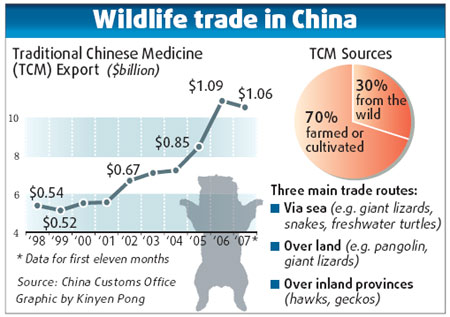
|
CHINA> National
 |
|
Related
Wildlife on menu spurs smuggling
By Wang Zhuoqiong (China Daily)
Updated: 2009-06-24 07:28 A rising appetite for wildlife and its increasing use in traditional Chinese medicine (TCM) are fueling an increase in the illegal imports of endangered animals, a senior official has said.
"Illegal wildlife trade used to be outbound, but domestic demand has reversed the trend," Wan Ziming, director of enforcement and training at the endangered species' office of the State Forestry Administration, told China Daily.
 Wild animals are mostly smuggled in at the southwestern border and coastal regions, according to figures by Customs and major border points. Because the trade is illegal, the number of smuggling cases uncovered does not reflect the full extent of the animals and plants being brought into the country, Wan said. Last year, there were 87 criminal cases of endangered species being smuggled, up from 77 in 2005, said Wan. In 2007, there was a spike in cases to 175. "Illegal wildlife trade is alive and dynamic," said Xu Hongfa, director of the World Wildlife Fund's (WWF) TRAFFIC East Asia China Program. "We have noticed an increasing amount of trade and consumption in wildlife, including bear paws, tortoises, pangolins and monitor lizards," he said. The smuggling has severely impacted the wildlife populations in neighboring countries, particularly Southeast Asian nations, Wan said.
He said the demand stems partly from a "resource dilemma" faced by the country - rich in variety, but scarce in amount. "The demand comes from a traditional culture of using wildlife for food and medicine," he said. "It is not easy to change the cultural habits of 1.3 billion people." Chinese people have long believed in the medicinal and health benefits of wild plants and animals. The trade in TCM products has also been growing at an annual rate of 10 percent, which has seriously impacted medicinal plant and animal populations, though more than half of plants and animals being used by TCM are from artificial propagation or captive breeding. Up to 20 percent of these are now considered threatened. Eating wild animals is also a traditional practice in southern China. The consumption of wild animals, which slowed amid the SARS epidemic in 2003, has once again gained popularity, a WWF survey has found.
Illegal trade in tiger meat and bones is also alive, continuing to threaten the extinction of an already depleted species, he said. Alarmingly, Xu said, more wealthy people are demanding elephant ivory for decorative purposes. Of the 87 wildlife cases uncovered by the Customs last year, more than half involved ivory, Wan said. "The profit margin is as high as in drug trafficking but the punishment is too mild," he said. He Yong from the International Fund for Animal Welfare China said the demand for wildlife springs from weak links in law enforcement - the use and trade of wild animal products is banned, but artificial breeding is allowed in many instances to fulfill the needs of customers. |
最近2019中文字幕免费大全5| 无码人妻黑人中文字幕| 人妻精品久久无码区| 最近2018中文字幕在线高清下载| heyzo高无码国产精品| 中文有码vs无码人妻| 亚洲欧美中文字幕| 欧美巨大xxxx做受中文字幕| 久久人妻少妇嫩草AV无码专区| 精品人妻无码区二区三区| 日韩精品中文字幕无码一区| av无码久久久久不卡免费网站| 亚洲AV综合色区无码一区| 亚洲福利中文字幕在线网址| 无码人妻少妇久久中文字幕蜜桃| 乱人伦人妻中文字幕无码| 久久久久久久人妻无码中文字幕爆| 久久久无码精品亚洲日韩蜜臀浪潮| 今天免费中文字幕视频| 欧美日韩亚洲中文字幕一区二区三区 | 日韩国产中文字幕| 日本妇人成熟免费中文字幕 | 无码人妻精品一区二区三18禁| 久久亚洲AV成人无码| 无码丰满熟妇juliaann与黑人 | 国内精品久久久久久中文字幕| 久久精品aⅴ无码中文字字幕重口 久久精品天天中文字幕人妻 | 国产精品无码av在线播放| 亚欧免费无码aⅴ在线观看| 日韩AV无码一区二区三区不卡毛片| 最近中文字幕在线| 最近中文字幕免费mv在线视频| 欧美日韩亚洲中文字幕二区| 中文字幕一区二区三区在线观看 | 最近最新中文字幕| 玖玖资源站中文字幕在线| a亚洲欧美中文日韩在线v日本| 最好看的中文字幕2019免费| 久久精品中文字幕一区| 亚洲日本中文字幕天堂网| 亚洲中文字幕无码久久2017|